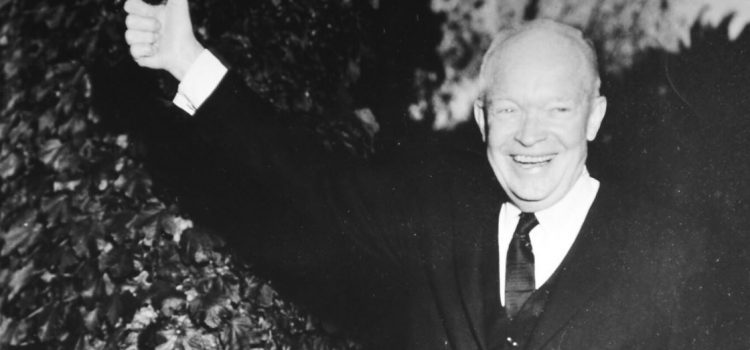

This article is an excerpt from the Shortform book guide to "The Road to Character" by David Brooks. Shortform has the world's best summaries and analyses of books you should be reading.
Like this article? Sign up for a free trial here .
In what ways did Eisenhower repress himself to please others? How did Eisenhower’s self-sacrificing nature eventually win him a seat as President?
In his book The Road to Character, David Brooks highlights some historical figures who put “we” before “me” and made sacrifices for the sake of humanity. One of the figures he discusses is Dwight D. Eisenhower.
Continue reading to learn about Dwight D. Eisenhower’s accomplishments and life story.
Dwight D. Eisenhower
Dwight D. “Ike” Eisenhower, the general who commanded the Allied invasion of France and later became U.S. President, demonstrated the importance of:
- Achieving self-restraint—controlling our emotions and conquerings our tendencies for impulsive action
- Building character through strict self-discipline
- Exercising patience—taking the long view and seeing beyond immediate gratification to larger, longer-term goals
- Leading with moderation—making important decisions gradually and incrementally rather than striving for a quick, dramatic fix
Eisenhower’s Character Development
Dwight Eisenhower was brought up in a strictly disciplined household. His parents had very little money and six children, all boys. His mother, Ida, forced the boys to learn good discipline and habits from a very young age. She insisted they start their chores at dawn, study for school, and read the Bible aloud daily. Ida gave the boys a lot of love but very little leeway in terms of moral choices. In her home, there were no card games, dancing, or frivolity—she believed that these temptations could lead to greater evils.
The young Eisenhower was smart and athletic, but he struggled with a temper that could easily flare into volcanic rage. In an essay he wrote when he was 76, he described how when he was young, he threw a red-faced tantrum because he wasn’t allowed to go trick-or-treating with his older brothers on Halloween. His father punished him and sent him to bed. Ida came to his room and read to him from the Bible, gently explaining that he needed to learn self-control. Eisenhower described this event as one of the defining moments of his life—learning that he needed to find a way to control his knee-jerk temper.
As a grown man, Eisenhower had two important mentors who contributed to building his character. First was General Fox Conner, who Eisenhower worked underneath for three years in Panama. Conner made Eisenhower his protégé, teaching him key points of war such as “never fight unless you have to.” He also taught him the value of being a humble leader, as exemplified in his motto, “Always take your job seriously, but never yourself.”
Eisenhower’s second important mentor was General Douglas MacArthur, but this relationship was much rockier. During his thirties, Eisenhower served as MacArthur’s personal assistant in the Philippines, and they often disagreed on policy matters. Being the subordinate, Eisenhower often had to repress his temper. At one point, Eisenhower tried to quit his post, but MacArthur forbade him. Eisenhower’s unhappiness grew, but because he was fiercely loyal to the U.S. Army, he continued to serve MacArthur.
Eisenhower’s Struggles
In his first twenty-five years in the Army, Eisenhower’s military career was less than stellar. As a college student at West Point, he was often in trouble for fighting with other soldiers. He developed a reputation for having discipline problems. After graduation, he wasn’t sent to combat in World War I, which was a major disappointment. He ranked as only a lieutenant colonel even in his late forties. He didn’t receive his first military star until age 51.
Eisenhower’s personal life was also unhappy. His firstborn son died of scarlet fever at three years old, an event which he called “the greatest disappointment and disaster in my life.”
Since life did not deliver the accolades that Eisenhower craved, he was forced into learning patience. He had no outlet for his internal anger, but his childhood lessons in self-restraint helped him to manage his disappointment. He graciously accepted whatever military position he was assigned, and he did each job to the best of his ability. He created an artificial persona of outward cheerfulness even while he struggled inwardly to repress his fiery temper.
Eisenhower developed a special technique for managing his anger. If someone crossed him, he would write down his or her name on a piece of paper, crumple it up, and toss it in his wastebasket. Then he could pretend the person was of no consequence. He often used this technique when he was criticized by news journalists. One of his more famous quotes is “Never waste a minute thinking about people you don’t like.”
His strategy of waiting patiently and practicing self-restraint eventually paid off. During World War II, he became a five-star general and served as Supreme Commander of the Allied forces in Europe. His military victory led to him being elected President in 1952. Dwight D. Eisenhower’s accomplishments didn’t stop there, he served for two terms, governing with careful moderation and balance. He believed that he could never make perfect decisions—there was too much conflict between rival interests to make it possible to please everyone—so he focused on making small moves in a very large political chess game. He was known for his ability to make adjustments and shift policies in response to changing circumstances.
Lessons From Eisenhower’s Life
- Virtue is made, not born. Self-control and strict behavior can create a virtuous person.
- We don’t need to act on every feeling.
- A leader’s job is to work toward making small changes. Don’t try to be a maverick or a pioneer. Moderation is critical to good leadership.

———End of Preview———
Like what you just read? Read the rest of the world's best book summary and analysis of David Brooks's "The Road to Character" at Shortform .
Here's what you'll find in our full The Road to Character summary :
- How the world has become "me-focused" rather than "we"
- An analysis of eight historical figures who selflessly contributed to the greater good
- A 15-point plan to help you live a more virtuous and happy life






